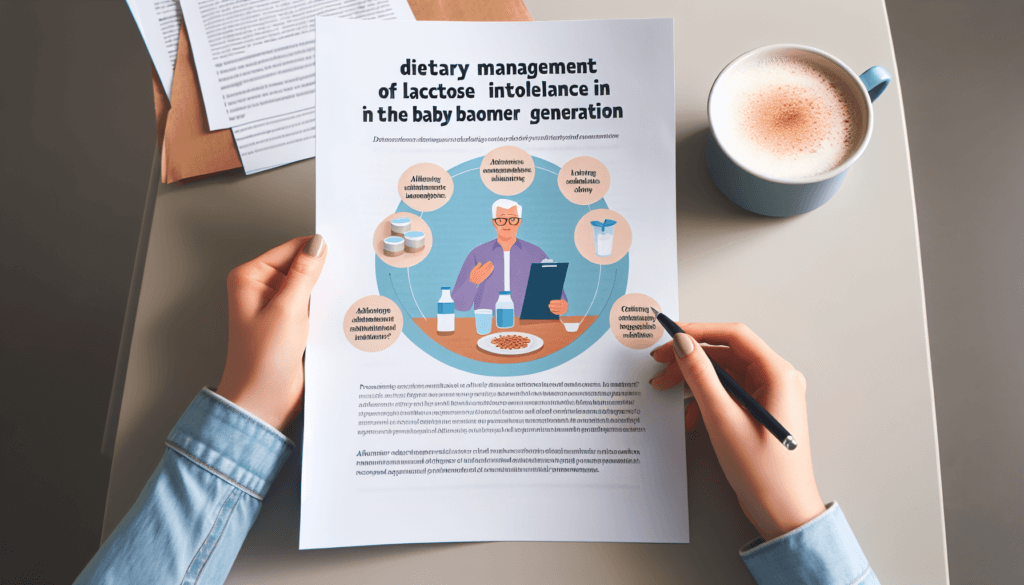If you’re a boomer and you find yourself constantly battling with lactose intolerance, you might be wondering what dietary adjustments you can make to manage this condition. Lactose intolerance is a common issue that affects many individuals as they age, and understanding how to navigate your diet to avoid discomfort is essential. In this article, we’ll explore the dietary recommendations specifically tailored for boomers dealing with lactose intolerance, helping you enjoy your favorite foods without worrying about the unpleasant consequences. So, let’s dive in and discover some simple yet effective dietary tips!

Understanding Lactose Intolerance
Lactose intolerance is a condition that occurs when your body is unable to fully digest lactose, a sugar found in milk and dairy products. It is caused by a deficiency of an enzyme called lactase, which is responsible for breaking down lactose. Without enough lactase, the lactose passes through your digestive system undigested, leading to various symptoms.
Causes of Lactose Intolerance
There are different causes of lactose intolerance. Primary lactose intolerance is the most common type and develops naturally over time. As you age, your body may produce less lactase, making it difficult to digest lactose. Secondary lactose intolerance can occur as a result of certain medical conditions or treatments that damage the small intestine, where lactase is produced.
Symptoms of Lactose Intolerance
If you are lactose intolerant, you may experience a range of symptoms after consuming lactose-containing foods. These symptoms can vary in intensity and may include bloating, gas, diarrhea, stomach cramps, and nausea. It’s important to note that lactose intolerance is not the same as a milk allergy, as the latter involves an immune response to milk proteins.
Prevalence of Lactose Intolerance in Boomers
Lactose intolerance is a common condition among individuals of all ages, including boomers. According to statistics, around 65% of the global population has a reduced ability to digest lactose after infancy. Among boomers specifically, the prevalence of lactose intolerance tends to be higher compared to other age groups.

Statistics on Lactose Intolerance Among Boomers
Research has shown that the prevalence of lactose intolerance increases with age. Studies have reported that approximately 75% of people over the age of 60 experience some degree of lactose intolerance. This higher incidence in boomers can be attributed to the natural decline in lactase production as we age.
Reasons for Increased Lactose Intolerance in Boomers
There are several factors that contribute to the increased prevalence of lactose intolerance among boomers. As we age, our bodies undergo physiological changes, including a decline in lactase production. This decrease in lactase activity can result in lactose intolerance. Additionally, certain medical conditions, such as celiac disease or inflammatory bowel disease, can also contribute to lactose intolerance in boomers.
Importance of Managing Lactose Intolerance in Boomers
Managing lactose intolerance is crucial for boomers to maintain optimal health and well-being. Untreated lactose intolerance can lead to discomfort and digestive issues, which can negatively impact one’s quality of life. By effectively managing lactose intolerance, boomers can avoid potential complications and enjoy a more comfortable and fulfilling lifestyle.
Impact of Untreated Lactose Intolerance in Boomers
Untreated lactose intolerance can have various negative effects on the health of boomers. Persistent digestive discomfort, such as bloating and diarrhea, can lead to nutritional deficiencies and dehydration. Additionally, lactose intolerance may interfere with the absorption of important nutrients like calcium and vitamin D, which are essential for bone health and overall well-being.

Benefits of Managing Lactose Intolerance in Boomers
Managing lactose intolerance can bring several benefits to boomers. By following a low lactose diet and making appropriate dietary substitutions, boomers can experience relief from digestive symptoms and improve their overall gastrointestinal health. Effective management of lactose intolerance also allows boomers to maintain a well-balanced and nutritious diet, ensuring they receive essential nutrients from alternative sources.
Consulting a Healthcare Professional
In order to effectively manage lactose intolerance, it is important for boomers to seek professional advice from a healthcare provider. A healthcare professional can properly diagnose lactose intolerance and provide personalized guidance on dietary modifications and nutritional needs. They can also help identify other underlying conditions that may be contributing to lactose intolerance symptoms.
Diagnosis of Lactose Intolerance in Boomers
The diagnosis of lactose intolerance typically involves a combination of medical history assessment, physical examination, and diagnostic tests. Your healthcare provider may recommend a lactose intolerance test, where you consume a lactose-rich drink and then undergo blood tests or breath tests to measure your body’s ability to digest lactose. It is important to consult with a healthcare professional for an accurate diagnosis.
Low Lactose Diet Recommendations
One of the key aspects of managing lactose intolerance is following a low lactose diet. This involves avoiding foods and drinks that are high in lactose and making appropriate substitutions. It is important to read food labels carefully, as lactose can be present in various processed and packaged foods. Some lactose-free or lactose-reduced alternatives are available, including lactose-free milk and lactose-free yogurt.

Avoidance of High Lactose Foods
To minimize symptoms of lactose intolerance, boomers should limit their consumption of high lactose foods. These include milk, ice cream, certain types of cheese (such as ricotta or cottage cheese), and butter. It is also important to be cautious when consuming foods that may contain hidden sources of lactose, such as baked goods, processed meats, and certain medications.
Substitutes for Dairy Products
For boomers with lactose intolerance, there are various alternatives to dairy products that can still provide essential nutrients. Lactose-free milk and dairy products are widely available and offer a similar taste and texture to regular milk. Additionally, non-dairy options like almond milk, soy milk, and oat milk can be used as substitutes. It is important to choose fortified alternatives that provide adequate levels of calcium and vitamin D.
Calcium and Vitamin D Supplementation
Since lactose intolerance can interfere with the absorption of calcium and vitamin D, it is important for boomers to ensure they are getting sufficient amounts of these nutrients. Calcium-rich foods such as leafy greens, tofu, and seafood can be included in the diet. If dietary intake is insufficient, calcium supplements may be recommended. Additionally, vitamin D supplementation can help enhance calcium absorption and support bone health.
Importance of Adequate Calcium Intake
Calcium is essential for maintaining strong bones and teeth, which is particularly important for boomers who may be at risk of osteoporosis and fractures. Adequate calcium intake is crucial for bone health and can help reduce the risk of osteoporosis-related complications. Managing lactose intolerance and ensuring adequate calcium intake go hand in hand for boomer’s overall well-being.

Choosing Calcium-Rich Foods
In addition to dairy products, there are many non-dairy foods that are rich in calcium and can be included in a lactose intolerant boomer’s diet. These include leafy greens like kale and spinach, almonds, tofu, and certain varieties of fish. It is important to incorporate a variety of calcium-rich foods into meals and snacks to meet the recommended daily intake.
Vitamin D Supplementation
Vitamin D is essential for calcium absorption and plays a key role in bone health. Since lactose intolerance can limit vitamin D absorption, boomers with lactose intolerance may benefit from vitamin D supplementation. It is recommended to consult with a healthcare professional to determine the appropriate dosage and duration of supplementation based on individual needs and levels.
Meal Planning and Portion Control
Meal planning and portion control are important strategies for effectively managing lactose intolerance. By designing balanced and nutritious meals, boomers can ensure they are getting the necessary nutrients from alternative sources. Portion control helps prevent overconsumption of lactose-containing foods, reducing the likelihood of symptoms. It is also important to consider the timing of lactose consumption and spread it out throughout meals.
Designing Balanced and Nutritious Meals
When designing meals for lactose intolerant boomers, it is important to include a variety of nutrient-rich foods. This can include lean proteins, whole grains, fruits, vegetables, and legumes. Opting for lactose-free or alternative dairy products can also ensure an adequate intake of calcium and other essential nutrients. Consulting with a healthcare professional or registered dietitian can provide personalized guidance for designing balanced and nutritious lactose-free meals.
Managing Dining Out and Social Gatherings
Managing lactose intolerance doesn’t mean missing out on dining out or social gatherings. By planning ahead and communicating dietary needs with the restaurant or host, boomers can still enjoy meals while avoiding lactose-containing dishes. Many restaurants now offer lactose-free or dairy-free options, and it can be helpful to review menus in advance. Bringing lactose-free alternatives or requesting ingredient substitutions can also help accommodate dietary needs.
Alternative Milk Options
For boomers with lactose intolerance, there are a wide variety of milk alternatives available. Plant-based milk alternatives, such as almond milk, soy milk, oat milk, and coconut milk, can provide a lactose-free option for enjoying cereal, coffee, or other recipes that require milk. It is important to choose unsweetened varieties to avoid added sugars, and to select fortified options that provide essential nutrients like calcium and vitamin D.
Choosing the Right Milk Alternatives
When selecting milk alternatives, boomers should consider their individual taste preferences and nutritional needs. Some milk alternatives may have a distinct taste or texture, so experimenting with different options can help find the best fit. Reading nutrition labels is essential to ensure that the chosen milk alternative is fortified with calcium and other important nutrients. Consulting with a healthcare professional or registered dietitian can provide guidance on choosing the right milk alternatives.
Probiotics and Gut Health
Probiotics can play a beneficial role in managing lactose intolerance by supporting gut health. Probiotics are live bacteria and yeasts that are good for your digestive system. They can help promote the breakdown of lactose and improve digestive function. Including probiotic-rich foods, such as yogurt or kefir, in the diet can help alleviate lactose intolerance symptoms and support overall gut health.
Benefits of Probiotics for Lactose Intolerance
Probiotics offer several benefits for boomers with lactose intolerance. They can help break down lactose and improve lactose digestion, reducing the likelihood of symptoms. Additionally, probiotics have been shown to enhance gut health, support immune function, and improve nutrient absorption. Including probiotics in the diet can contribute to overall digestive well-being and help manage lactose intolerance symptoms.
Sources of Probiotics
Incorporating probiotic-rich foods into the diet is an effective way to introduce beneficial bacteria into the gut. Yogurt, kefir, sauerkraut, kimchi, and kombucha are all examples of foods that contain probiotics. It is important to choose varieties that are suitable for lactose intolerant individuals, such as lactose-free yogurt or plant-based kefir. Additionally, probiotic supplements are available for those who may have limited access to probiotic-rich foods.
Managing Lactose Intolerance Symptoms
Managing lactose intolerance involves identifying personal triggers and finding strategies to alleviate digestive discomfort. Keeping a food diary can help identify specific foods or drinks that may cause symptoms. Gradually reintroducing lactose-containing foods in small quantities may also help boomers better understand their tolerance levels. If symptoms persist or worsen, it is important to consult with a healthcare professional for further evaluation and guidance.
Identifying Personal Triggers
Each individual may have different triggers for lactose intolerance symptoms. For some boomers, consuming larger quantities of lactose at once may lead to symptoms, while others may have intolerance to specific lactose-containing foods. By closely monitoring their dietary intake and noting any symptoms that arise, boomers can identify their personal triggers and make necessary adjustments to their diet and lifestyle.
Dealing with Digestive Discomfort
In the event of digestive discomfort from lactose intolerance, there are various strategies to alleviate symptoms. Over-the-counter lactase supplements can be taken before consuming lactose-containing foods to help digest lactose. For mild symptoms, resting, drinking plenty of fluids, and applying heat to the abdomen can provide relief. If symptoms persist or worsen, it is important to consult with a healthcare professional for proper evaluation and management.
In conclusion, managing lactose intolerance is crucial for boomers to maintain a comfortable and balanced lifestyle. By understanding the causes and symptoms of lactose intolerance, boomers can take proactive steps towards effectively managing their condition. Seeking professional advice, following a low lactose diet, and incorporating appropriate substitutes and supplements can help boomers navigate lactose intolerance and enjoy a nutritious and fulfilling diet. With careful planning and awareness, boomers can embrace a lifestyle that supports their well-being and minimizes the impact of lactose intolerance.


